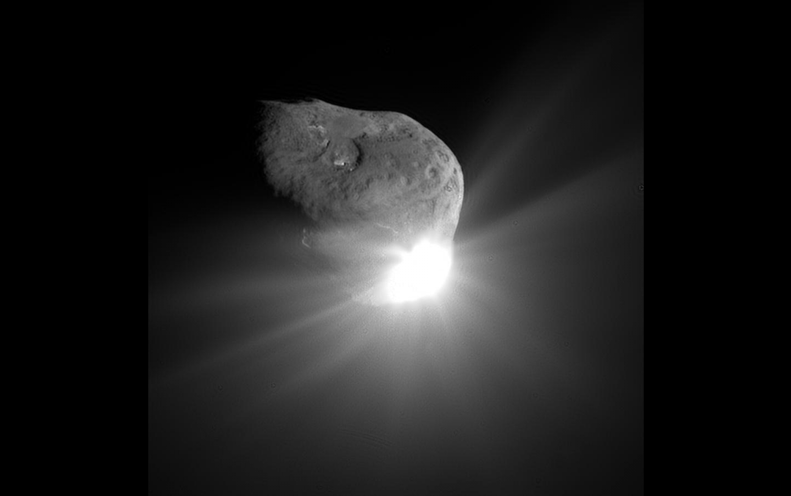Asteroid Near Jupiter With Backwards Orbit May Be From Outside Our Solar System
SARAH GRAY, Fortune | May 21, 2018
An asteroid in Jupiter’s orbit may be the first one known to have come from outside our solar system.
If the findings are confirmed, asteroid 2015 BZ509, known as BZ, may give scientists the opportunity to learn more about interstellar objects, or objects from beyond our solar system.
The discovery was made by Fathi Namouni, a researcher at Côte d’Azur Observatory in France, and Helena Morais, a researcher at São Paulo State University in Brazil. The findings were published in Monthly Notices of the Royal Astronomical Society.
“This shows the solar system is home to objects which were born around other stars,” Dr. Morais told Scientific American. “Thus, matter in other star systems could influence the evolution of our own solar system.”
The researchers discovered BZ in 2015, according to the BBC. They used a supercomputer to simulate millions of possible “orbital parameters” to help determine its interstellar origin, according to Scientific American.
“We had this simulation which uses intense computing… to actually trace back in time to where this asteroid was when the planets finished forming,” Dr. Namouni explained, according to the BBC.
“Honestly we didn’t have any idea what we were going to find,” Namouni continued. “The last thing we expected… was that BZ has been in its current position most of the time.”
Part of what makes BZ unique is that the asteroid has a retrograde orbit, which means that it orbits the sun in the opposite direction of most of our solar system’s other celestial objects. While BZ matches Jupiter’s orbit and takes the same amount of time to circle the sun as Jupiter, its orbit moves the other way.
“We did not expect that the asteroid would remain bound to Jupiter and that it would hang on in there for 4.5 billion years, but it did!” Namouni told Scientific American. “Since the asteroid’s orbit was right there as it is now — in retrograde and in the same resonance with Jupiter — it can’t have been born in the solar system.”
Still, some remain skeptical of BZ’s potential interstellar origins. “For a realistic flux of interstellar material, does capture happen often enough to make the discovery of such an object plausible?” Scott Tremaine, an astrophysicist from the Institute for Advanced Study in Princeton, and who did not take part in the research, told Scientific American.
The possibility that BZ is from outside our solar system does open new chances for exploration: Figuring out where it may have come from and what it is made of.
 |
 |
|
|||||||||||
 |
 |
||||||||||||
|
|
|
|
|
|
|
||||||||
 |
|
|
|
|
|
 |
|||||||
|
|
|
|
|||||||||||
|
|
|||||||||||||
|
|
|
|
|
|
|
|
|
|
|
|
|
|
|
Results 1 to 1 of 1
Thread: Asteroid Near Jupiter
-
05-25-2018, 11:20 PM #1
Asteroid Near Jupiter
Beginner's Guide for Rocket, NFPS and IKS66...
http://iptvtalk.net/showthread.php?2...-you-should-do
Kodi Options for Rocket, NFPS and IKS66...
http://iptvtalk.net/forumdisplay.php?71-Kodi
Check the Announcement Section...
http://iptvtalk.net/forumdisplay.php...-Announcements
Similar Threads
-
Jupiter at its brightest
By crazed 9.6 in forum The Universe Closer to HomeReplies: 0Last Post: 08-20-2021, 09:52 PM -
Jupiter
By crazed 9.6 in forum The Universe Closer to HomeReplies: 1Last Post: 07-12-2020, 12:29 PM -
What’s going on with Jupiter’s Red Spot?
By ilan in forum The Universe Closer to HomeReplies: 0Last Post: 03-25-2019, 12:17 PM -
Picture of the Day: Jupiter
By ilan in forum The Universe at a GlanceReplies: 0Last Post: 06-05-2018, 11:40 AM -
Asteroid flyby ... asteroid originally designated ZLAF9B2 – now called 2018 LA
By ilan in forum The Universe Closer to HomeReplies: 0Last Post: 06-04-2018, 12:06 PM







 Reply With Quote
Reply With Quote